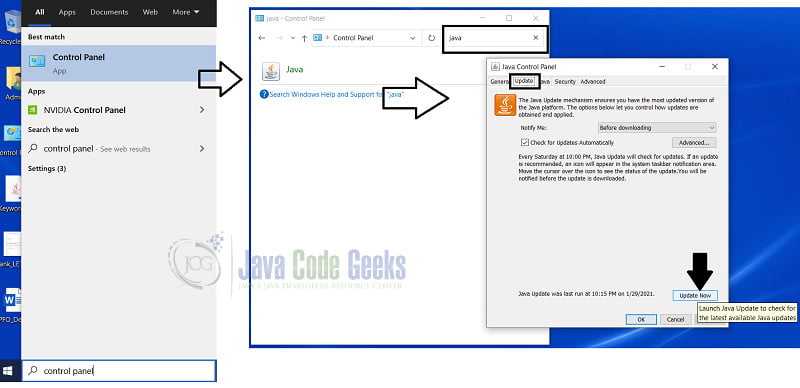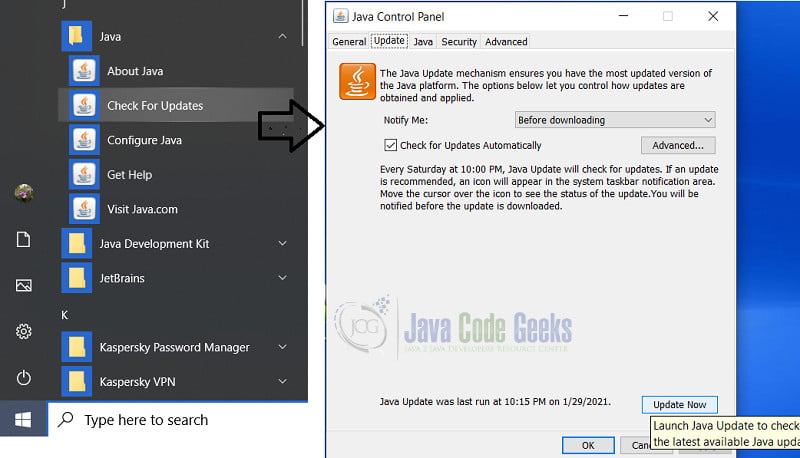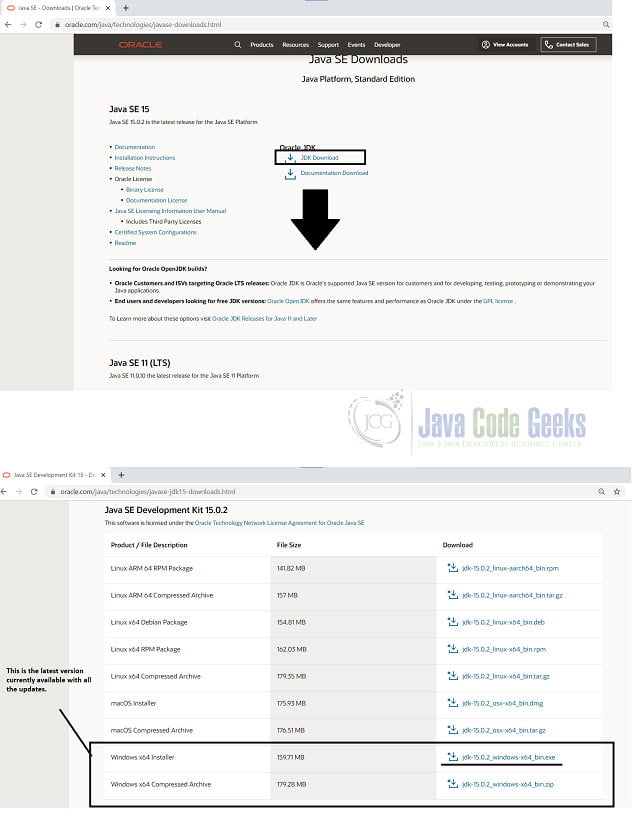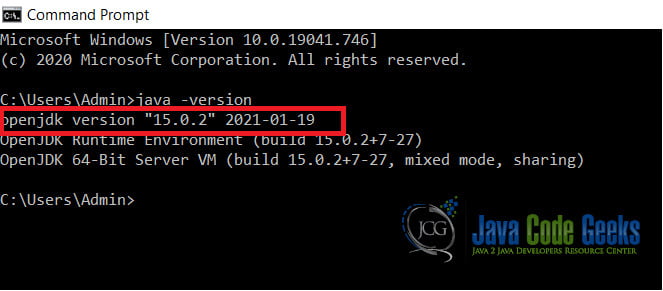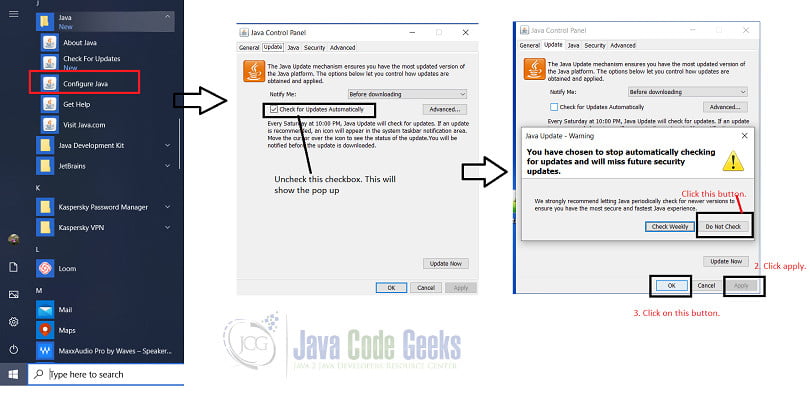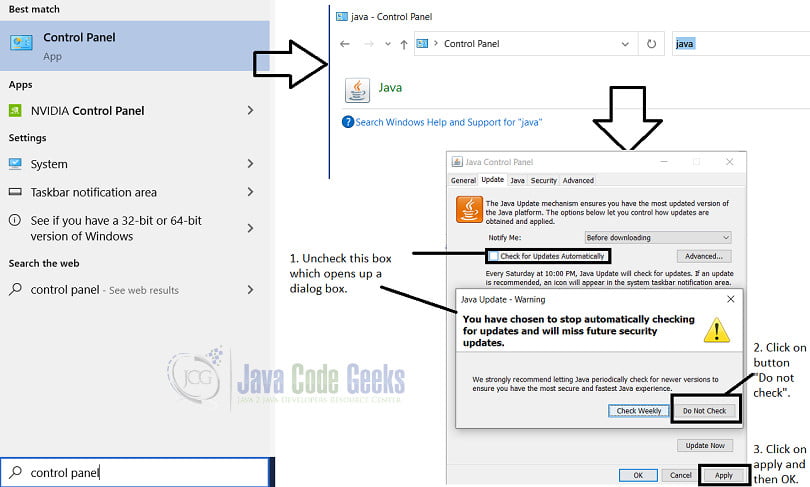How to check Java Update
1. Introduction
In this article, we will look how we check for a Java update.
2. How do I check for Java updates?
Depending on what Java version we have installed, we can check for Java updates.
2.1 Java version 8 and earlier versions:
For all versions till Java 8, we have a “Check for Updates” tab in the Java Control Panel. To open the Java Control Panel:
- Click on the Windows icon.
- Navigate to the Java folder
- In that folder, the Check for Updates tab is present
Alternatively, we can open Control Panel, search for Java and open the Java tab.
Navigate to the “Updates” tab, and click on the “Update Now” button to check for updates. By Default, Java is set to “Auto-Updates”.
2.2 Java versions 11 and onwards
From Java version 11, Oracle has wholly removed the Java Control Panel and the ability to auto-update Java. More information available here under the title Removal of Java Deployment Technologies.
For all versions post-Java 11, be it Oracle JDK or OpenJDK JDK, the onus of updating Java is on the user.
Next, we will check how to check if an update is required or not for post-Java 11.
2.2.1 Oracle JDK
The steps to follow are as follows:
- Open the Command Prompt and trigger the following command
java -version
Assuming that we have set the classpath correctly, the Java -version command will show the current Java version that the system is using. For example, my computer is using the Java 15.0.1 JDK version.
- The next step is to visit the java site.
- The Site for Oracle JDK is here.
- In the Oracle site listed above, Oracle lists all the latest LTS versions in descending order.
- Clicking on the JDK Download link navigates to the main download page.
- The download files have the latest version number. For example: at the time of writing this article, the latest version of Oracle JDK available is 15.0.2.
- If the version we have installed on the system does not match, i.e., is less than the version listed, then an update is required. For example: as of this moment, the java version on my system is one less than the current version.
2.2.2 OpenJDK
If your system has an Open JDK set up and we have set the classpath correctly, then we can check for updates as follows:
- Open the Command Prompt and trigger the following command
java -version
Assuming that we have set the classpath correctly, the Java -version command will show the current Java version that the system is using. For example, my computer is using the Java 15.0.2 JDK version.
- The next step is to visit the OpenJDK site.
- The “Ready to Use” title on the site shows the current base version of Java available.
- Clicking on that link navigates us to the actual download page.
- The latest version available for download is the title of the page.
- All the other earlier versions will be present in the archives.
We need to update if the versions mismatch. For example, my system has the latest version installed, so no updates are required.
3. Why check for updates?
Java fixes security and vulnerability issues found in the earlier versions with every new version deployed. So, to get all the latest security patches, we need to update the java version regularly. As per Oracle,
We highly recommend that you uninstall all older versions of Java from your system.
Keeping old versions of Java on your system presents a serious security risk.
Uninstalling older versions of Java from your system ensures that Java applications will run with the latest security and performance improvements on your system.Oracle on Java.com
As mentioned in the quote above, there are significant security fixes done with every new java version. Using an older version of Java poses serious security threats. The most dramatic example of this was the Java-borne Trojan, called Flashback, which affected Apple Macs.
4. Can we turn off Auto-Updates? How do we do it?
If we have the java version of less than 8, then we can turn off Auto-updates. Post java version 11, this facility is not present.
4.1 Java version 8 or less
For java versions of 8 or less, Java checks for updates regularly. We can disable auto-updates if we wish, although Oracle does not recommend it. To disable Auto-updates
- Click on the Windows icon and navigate to the Java folder.
- In the Java folder, click on the Configure option.
- The Configure-window has the Update tab. Navigate to the Updates tab.
- In the Updates tab, uncheck the checkbox for auto-updates.
- A warning is triggered, click on the “Do not check” button, then click Apply and then the ok button.
This action would disable auto-updates.
Alternatively, we can open the Control Panel, search for Java and then open the Java Control Panel. The rest of the steps are the same as above.
4.2 Java 11 and later
For all java versions after version 11, there is no auto-update facility. The onus of updating Java is on the user. To update Java, please refer to the steps mentioned above.
When we install a new version of Java, Oracle does not remove/uninstall the older versions. If we do not require these versions, Oracle and the Java community recommends that we uninstall the older versions. So, we ensure that we always use the latest java version and don’t inadvertently use a less-secure java version.
5. Summary
In this article, we checked how to update Java and how to disable auto-updates. Oracle and the java community always recommend updating Java to the latest version. Doing so ensures that our computers have the latest security patches and hence are less vulnerable to attacks.

